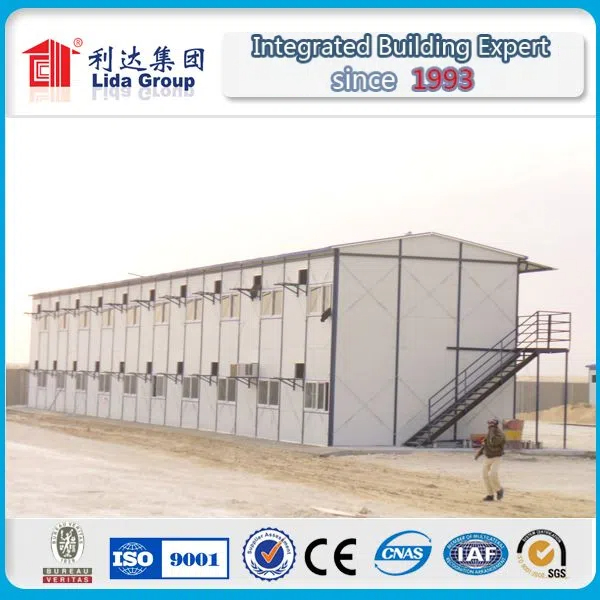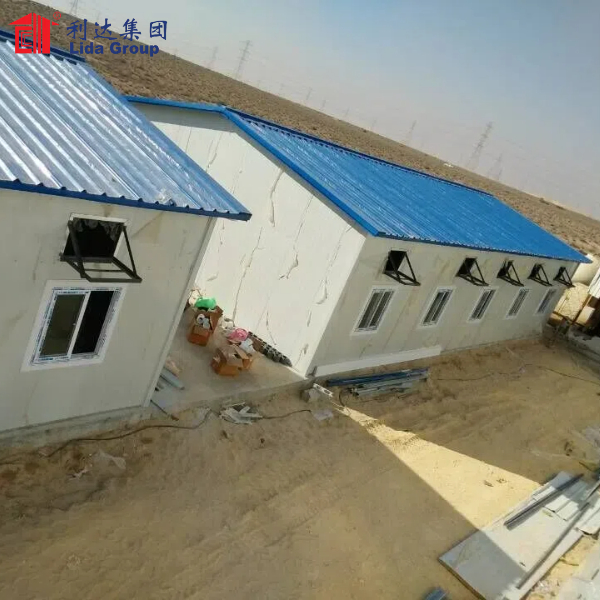Introduction
In the modern industrial landscape, the need for effective labor camps has become increasingly significant. Industries such as construction, mining, and energy often require temporary housing solutions for their workforce, particularly in remote locations. Traditional labor camps, however, often fall short in terms of comfort, functionality, and community. This is where customized prefab houses come into play. Offering a range of benefits, these innovative solutions are transforming how labor camps are designed and operated. This article explores the reasons why customized prefab houses are the ideal choice for labor camps, focusing on their advantages, design flexibility, cost-effectiveness, and overall impact on worker satisfaction and productivity.
Understanding Labor Camps
What Are Labor Camps?
Labor camps are temporary housing facilities designed to accommodate workers who are engaged in projects away from their homes. These camps serve various industries, providing necessary shelter and amenities to support the workforce. Key features of labor camps typically include:
- Sleeping Quarters: Individual or shared rooms for workers.
- Dining Facilities: Areas for meal preparation and consumption.
- Common Spaces: Zones for social interaction and recreational activities.
- Health and Safety Amenities: Medical facilities and safety measures to protect workers.
Challenges of Traditional Labor Camps
While labor camps are essential, traditional setups often face several challenges:
- Poor Living Conditions: Many labor camps lack adequate amenities, leading to discomfort and dissatisfaction among workers.
- Limited Privacy: Overcrowded conditions can result in stress and mental health issues.
- Inadequate Social Spaces: The absence of communal areas hinders social interaction and community building.
As expectations of workers evolve, there is an urgent need for housing solutions that prioritize comfort, functionality, and community.
The Rise of Customized Prefab Houses
What Are Customized Prefab Houses?
Customized prefab houses are pre-manufactured buildings that can be tailored to meet specific needs and preferences. These structures are constructed off-site and then transported to the desired location for assembly. The customization aspect allows for flexibility in design, enabling companies to create living spaces that align with the unique requirements of their workforce.
Benefits of Customized Prefab Houses
- Rapid Deployment: Customized prefab houses can be assembled quickly, allowing for swift setup of labor camps in remote locations.
- Scalability: Modular designs enable easy expansion or reconfiguration based on the size of the workforce and project needs.
- Quality Construction: Prefab houses are built using high-quality materials in a controlled environment, ensuring durability and safety.
- Cost-Effectiveness: Lower construction and operational costs make prefab houses a financially viable solution for labor camps.
- Sustainability: Many prefab solutions emphasize eco-friendly practices, reducing the environmental impact of construction.
Key Advantages of Customized Prefab Houses for Labor Camps
1. Enhanced Comfort and Living Conditions
One of the most significant advantages of customized prefab houses is the ability to create comfortable living spaces for workers. This includes:
- Privacy: Individual or semi-private rooms can be designed to provide workers with personal space, vital for mental well-being.
- Quality Amenities: Customized designs can include modern bathrooms, kitchen facilities, and recreational areas, enhancing the overall living experience.
- Climate Control: Proper insulation and HVAC systems ensure that workers remain comfortable in various weather conditions.
2. Design Flexibility
Customized prefab houses offer unparalleled design flexibility, allowing companies to tailor their labor camps to meet specific needs. This includes:
- Modular Configurations: Units can be arranged in various layouts, accommodating different workforce sizes and project types.
- Interior Customization: Companies can choose materials, colors, and finishes that reflect their brand or create a welcoming atmosphere.
- Functional Spaces: Prefab designs can include communal dining areas, lounges, and training rooms, fostering social interaction and collaboration among workers.
3. Cost Efficiency
Investing in customized prefab houses can lead to significant cost savings in both the short and long term. Key factors include:
- Lower Initial Costs: The use of prefabricated materials often results in reduced construction costs compared to traditional building methods.
- Reduced Labor Costs: The efficiency of factory production minimizes the amount of labor required on-site, further lowering costs.
- Long-Term Savings: Durable construction and energy-efficient designs lead to lower maintenance and operational costs over time.
4. Sustainability and Environmental Impact
Sustainability is a growing concern in the construction industry, and customized prefab houses offer several eco-friendly benefits:
- Reduced Waste: Prefabrication minimizes construction waste, as materials are cut to size in a controlled environment.
- Energy Efficiency: Many prefab houses are designed with energy-efficient features, such as solar panels and high-quality insulation, reducing their carbon footprint.
- Recyclable Materials: The use of sustainable materials promotes a circular economy, as many components can be reused or recycled.
5. Improved Worker Satisfaction and Productivity
The living conditions provided by customized prefab houses directly impact worker satisfaction and productivity. Key aspects include:
- Comfortable Living: Enhanced comfort leads to better rest and overall well-being, allowing workers to perform at their best.
- Community Building: Common areas and recreational facilities foster social interaction, strengthening team cohesion and morale.
- Health and Safety: On-site medical facilities and wellness programs promote physical and mental health, reducing absenteeism and increasing productivity.
Case Studies: Successful Implementation of Customized Prefab Houses
1. Construction Project in a Remote Area
In a recent project located in a remote area, a major construction company partnered with a prefab housing provider to create a customized labor camp for over 300 workers. The project featured:
- Individual Sleeping Units: Designed for privacy and comfort, ensuring workers had a personal space to unwind.
- Common Dining Area: A spacious dining facility that accommodated large groups while offering a variety of meal options.
- Recreational Facilities: A gym and outdoor lounge area to promote relaxation and socialization.
Results
- Increased Worker Satisfaction: Feedback indicated a significant improvement in satisfaction due to the quality of living conditions.
- Enhanced Productivity: The contractor reported improved productivity levels, attributing this to the comfortable and supportive living environment.
2. Mining Operations in Challenging Environments
A mining company operating in a challenging environment sought customized prefab housing solutions for its workforce. The aim was to provide safe, comfortable, and functional living spaces under difficult conditions.
Implementation
The housing provider developed a customized labor camp featuring:
- Durable Structures: Constructed to withstand extreme weather conditions while ensuring safety and comfort.
- Community Spaces: Common areas that encouraged social interaction and team-building activities among workers.
- Health and Wellness Facilities: Access to recreational areas and health services to support workers’ physical and mental well-being.
Results
- Improved Retention Rates: The company noticed a decline in turnover rates as workers expressed greater satisfaction with their living conditions.
- Positive Community Atmosphere: The design fostered strong relationships among workers, enhancing teamwork on-site.
Economic Impact of Customized Prefab Housing Solutions
1. Job Creation
The construction and deployment of customized prefab houses can lead to job creation in various sectors, including:
- Manufacturing: The production of prefab units generates jobs in factories, contributing to local economies.
- Construction: On-site assembly and customization require skilled labor, further boosting employment.
2. Stimulating Local Economies
Investing in labor camps built from customized prefab houses can stimulate economic growth in local communities:
- Infrastructure Development: The establishment of labor camps often necessitates improvements in local infrastructure, benefiting the broader community.
- Increased Business Activity: The presence of temporary housing can boost local businesses, such as shops and services catering to workers and residents.
3. Cost Savings for Companies and Governments
Customized prefab houses can provide cost savings for both private companies and governments:
- Reduced Housing Costs: Utilizing prefab homes for low-income housing helps address housing shortages without significant financial burden.
- Efficient Disaster Response: Rapid deployment of prefab houses during emergencies can lower costs associated with long-term disaster recovery efforts.
The Future of Customized Prefab Housing
1. Innovations in Design and Technology
As technology continues to advance, the prefab housing industry is poised for innovation. Future developments may include:
- Smart Home Features: Integration of IoT devices for energy management, security, and comfort.
- Advanced Materials: Utilizing new materials that enhance insulation and sustainability.
2. Expansion into New Markets
The demand for customized prefab housing solutions is growing worldwide. Companies are keen to explore new markets and adapt their offerings to meet the unique challenges faced by different industries.
3. Commitment to Sustainability
The future of labor camps will increasingly focus on sustainability. Customized prefab houses can play a crucial role in promoting eco-friendly practices, ensuring that the construction industry aligns with global sustainability goals.
Conclusion
Customized prefab houses are revolutionizing labor camps, offering a range of benefits that enhance worker comfort, satisfaction, and productivity. By providing high-quality, flexible, and sustainable housing solutions, companies can create environments that support their workforce and promote overall well-being.
As the demand for effective labor camps continues to grow, customized prefab houses represent a forward-thinking approach that addresses the challenges of traditional housing solutions. With their numerous advantages, these innovative structures are not just buildings; they are vital components of a thriving workforce and a sustainable future. Investing in customized prefab houses is not only a smart business decision but also a commitment to the welfare of the workforce, ensuring a better quality of life for those who contribute to the success of various industries.
Contact Us
Post time: Nov-19-2024


